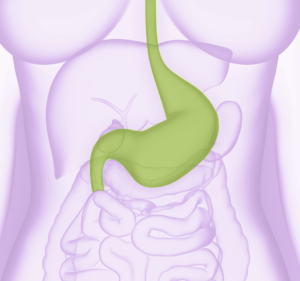
My name is Heidi Wisnioski and I’m here to share that even as a dietitian going on 13 years of practice, I don’t think I ever truly understood how important it was to keep your gut healthy until I started struggling with my own autoimmune issues. Sure, I knew how to eat healthy, but why did I still feel so bad?
I quickly learned how vital the gut is to our health and that even healthy foods could be fine for one person, but not the next. After struggling a long time on my own, I decided to work with a Functional Medicine Practitioner. One of our main focuses was healing the gut.
It turns out, gut health has been investigated for its connections to several aspects of health including autoimmune diseases and CKD. In an extremely interesting article by Dr. Jefrey Bland, Chronic Kidney Disease: The Gut-Kidney Connection?, the author discusses a treatment plan they used with their patients, some of which had autoimmune kidney disease. I found this very similar to the steps I took to improve my gut health and feel like myself again.
The plan involved:
- Removal of antigens and infectious organisms from exposure to the gut
- Food allergens
- Bacteria overgrowth
- Possible parasites
- Toxins/Chemicals
- Replacement of digestive enzymes and stomach acid as needed.
- Reinoculation of the gut with symbiotic microflora using prebiotics and probiotics.
- Supporting the repair of the intestinal mucosal lining with nutrients such as glutamine, zinc, pantothenic acid, and omega-3 fatty acids.
We know that the microbiome is altered in kidney disease and Bland goes on to explain how dysbiosis of the intestinal microbiome as well as “leaky gut” contributes to the progression of CKD. While it would be highly unlikely to get your patients to adhere to the strict plan discussed, there are some more realistic ways to improve their gut health.
-
- Prebiotic dietary fiber- Bland reviews a study which “suggests that a diet that is adequate in prebiotic fiber is important in maintaining a microbiome that produces less uremic toxins.”
- Some good sources of prebiotics include whole grains, leafy greens, beans, garlic, and onions.
- Certain phytochemical-containing foods and spices may have anti-inflammatory, antioxidant, and antibacterial properties. Use your best clinical judgment before recommending to patients.
- Turmeric – the active compound is curcumin which may improve inflammation, oxidative stress, restore gut function, and has
anti-bacterial properties to improve microbiota. No adverse effects were reported in supplementation for CKD patients. - Green tea – contains epigallocatechin gallate (ECGC), a polyphenol which may have antioxidant and
anti-inflammatory properties to protect the kidneys against various diseases. - Ashwagandha – a member of the Solanaceae family of plants which contain withanolides a bioactive compound that has
anti-inflammatory, antioxidant, and renoprotective properties in acute renal injury.
- Turmeric – the active compound is curcumin which may improve inflammation, oxidative stress, restore gut function, and has
- Clinically tested probiotics-Live, beneficial microorganisms found in certain foods and dietary supplements. Specifically, bacteria in the Lactobacillus and Bifidobacterium group may decrease urea, BUN, ammonia, and uremic toxins while replenishing healthy bacteria that
help keep the intestinal mucosal barrier healthy.- Consider helping your patients add foods that contain probiotics such as sauerkraut, kimchi, kombucha, kefir, and yogurt.
- If supplementation is recommended, help patients choose a quality probiotic from a reputable company.
- Prebiotic dietary fiber- Bland reviews a study which “suggests that a diet that is adequate in prebiotic fiber is important in maintaining a microbiome that produces less uremic toxins.”
While research and clinical trials are ongoing, I think we can all agree that it is important to help our patients understand the importance of gut health and make positive changes to help keep them (and their gut) happy and healthy!
References
- Integrative Medicine: A Clinician’s Journal, 16(1).https://www.ncbi.nlm.nih.gov/pmc/articles/PMC6271001/
- Bagherniya, M., Soleimani, D., Rouhani, M. H., Askari, G., Sathyapalan, T., & Sahebkar, A. (2021). The use of curcumin for the treatment of renal disorders:
a systematic review of randomized controlled trials. Studies on Biomarkers and New Targets in Aging Research in Iran: Focus on Turmeric and Curcumin, 327-343. - Kanlaya, R., & Thongboonkerd, V. (2019). Protective effects of epigallocatechin-3-gallate from green tea in various kidney diseases. Advances in Nutrition, 10(1), 112-121.
- White, P. T., Subramanian, C., Motiwala, H. F., & Cohen, M. S. (2016). Natural withanolides in the treatment of chronic diseases. Anti-inflammatory nutraceuticals and chronic diseases, 329-373.
- Fagundes, R. A. B., Soder, T. F., Grokoski, K. C., Benetti, F., & Mendes, R. H. (2018). Probiotics in the treatment of chronic kidney disease: a systematic review. Jornal brasileiro de nefrologia, 40(3), 278–286. https://doi.org/10.1590/2175-8239-jbn-3931

We thank our guest blogger Heidi Wisnioski, Nutrition Therapy Consultant for sharing her knowledge and writing this blog post!
